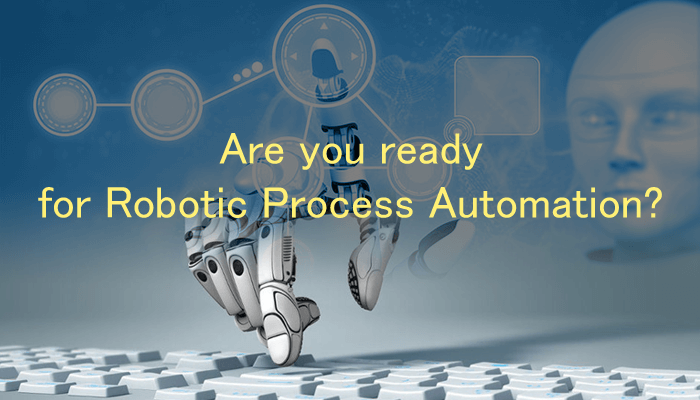Are you ready for Robotic Process Automation?
I'd say that the biggest misconception about RPA is that it's easy—It's not easy. That's why barely 10% of the buyer population in Global 2000 companies have embraced it.' — Frank Casale, founder, and CEO of the Institute for Robotic Process Automation and Artificial Intelligence (IRPA AI)
Given that warning, it would make sense to assess the internal readiness and capacity of your company before adopting or even considering RPA technology. RPA, or robotic process automation, sometimes conjures up images of a solution that helps with cognitive computing.
While that may represent the ultimate level of artificial intelligence that exists, solutions that are being developed in the present focus more on automating repeatable, predictable, and fixed business processes.
When we speak about enterprises, this technology is still perhaps hard to implement, but experts say that those that do adopt RPA will rapidly see the immense benefits. For companies, it could mean a winning strategy for all the stakeholders — employees included. Let us look in-depth into the possible benefits of embracing Robotic Process Automation (RPA).
Firstly — what is Robotic Process Automation?
With the surge in digitization and the increasing demand on the already limited resources, the push towards adopting automation technology has now become a necessity. Technology adoption would help to empower organizations and accelerate their efforts towards gaining more business and staying ahead of their competition.

Robotic Process Automation is specifically made software that is capable of simulating human conducted activities that would be routine and repetitive in nature. The software 'robots' follow designated workflows, seeking information from clearly identified sources and then performing routine yet critical operations. The functions impacted could include back-office processing, support, and front office management. Today, several companies have begun using these solutions with resounding success.
Benefits of Robotic Process Automation to Organizations:
- RPA is best for transactional or rule-bound processes and for organizing data. Using robotic technology companies have a reduced effort and even lowered full-time equivalent employee (FTE) requirement.
- By incorporating RPA into the rules of business, companies would be able to simplify processes, conduct speedier transactions, maintain uniformity in their documentation, and afford complete transparency of their processes. These factors incidentally are among the top priorities for customers today, which therefore would lead to enhanced business and success.
- Using RPA reduces the opportunities for human error in rote tasks, and limits the exposure of sensitive and confidential information to humans — critical for the proper functioning of any company.
- Several companies require huge amounts of data to be added to various systems and myriad applications. Manual data entry is prone to errors especially given the mundane nature of the task. By using RPA in this process, companies can be sure of increased output of work with no errors, thereby removing the requirement of extra headcount to check and correct the errors. Re-work is eliminated as well.
- Since several tasks can be completed in less time and at a lowered cost, the ROI of the initiative can be achieved relatively quickly.
- Since RPA is a software, it has endless possibilities and capacity to work — meaning around the clock availability and work churned out. This means a lot more work with no interruptions or breaks.
Where Robotic Process Automation Stops?
These RPA-driven software robots are capable of making only limited decisions and the cognitive ability is extremely constrained. In some ways, the primary objective is significantly improving the efficiency, not really the effectiveness. That's to say, RPA allows organizations to perform these functions faster, with less effort, utilizing fewer human resources, and with greater accuracy. That said, if there is ambiguity about the inputs or if there is volatility in the functions to be addressed or the business processes are extremely fluid and dynamic, RPA is less likely to be successful.
A Bright Future for Robotic Process Automation( RPA)
It has been said often that the downside of cognitive artificial intelligence is that it would reduce the number of jobs and dislodge employees from their roles. RPA on the other hand empowers employees by allowing them to engage in more creative and value-added tasks and removing the dull, rote ones.
Well-designed RPA solutions have this distinct advantage — companies can embrace them without the need to dismiss employees or spend too many resources in training them on the solutions. The great part of RPA is that it requires human supervision, placing control in the hands of the employees, thereby raising their morale, enhancing their development, and making them more productive on the job. Different types of organizations are already tasting success in areas like:
- Government: Verifying existing processes; populating forms and assigning subcontractors to jobs, and integrating legacy systems with newer systems.
- HR: Providing employee on-boarding; better managing leave of absence requests; more efficiently populating employee data into multiple systems, and offering performance appraisal management.
- IT: Creating new accounts; installing software and updates more seamlessly, and setting up printers and workstations.
Conclusion:
It is probably time to integrate RPA solutions into your company, and the good news is technologies, including strategies borrowed from test-automation, are already at hand to seamlessly draw RPA into your business processes. Are you ready, is the question?
Share This Article:







